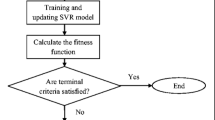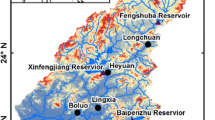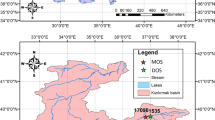Abstract
Forecasting daily and monthly streamflows is necessary for short- and long-term water resources management, particularly in extreme cases, e.g., flood and drought. Accurate models are needed to plan and manage water resources in watersheds. Recently, support vector regression (SVR) shows the ability to handle the hydrological forecasting issues, but the accuracy of SVR depends on the appropriate choice of parameters and selection of proper inputs. A new meta-heuristic algorithm called grey wolf optimizer (GWO) is used in the current research in order to improve SVR accuracy in forecasting monthly streamflow. The proposed approach is compared with other evolutionary methods, particle swarm optimization, shuffled complex evolution, and multi-verse optimization, that are employed in tuning SVR parameters. Furthermore, the proposed methods were also combined with wavelet transform and tested using monthly streamflow data from two gauging stations, Ain Bedra and Fermatou, in Algeria. To assess the performance of the developed models, Nash–Sutcliffe efficiency (NSE), correlation coefficient, root mean squared error (RMSE), and mean absolute error (MAE) were used. The obtained results indicate that multi-linear regression provides appropriate input variables to SVR models. According to all of the performance measures used, hybrid models exhibit better performances, in monthly streamflow prediction, compared with single versions. For example, for the Ain Bedra station, the NSEcriterion and the correlation coefficient values increased considerably from 27.36% and 0.5405, for the single models, to 95.72% and 0.9786, for the hybrid models. A great decrease has also been obtained for the RMSE and MAE values, which decreased from 0.1562 m3/s and 0.1244 m3/s to 0.6433m3/s and 0.3047 m3/s. In addition, the new GWO algorithm outperformed the other algorithms in terms of both forecasting accuracy and convergence.











Similar content being viewed by others
References
Adamowski J, Sun K (2010) Development of a coupled wavelet transform and neural network method for flow forecasting of non-perennial rivers in semi-arid watersheds. J Hydrol 390:85–91. https://doi.org/10.1016/j.jhydrol.2010.06.033
Alizamir M, Kisi O, Zounemat-Kermani M (2018) Modelling long-term groundwater fluctuations by extreme learning machine using hydro-climatic data. Hydrol Sci J 63:63–73. https://doi.org/10.1080/02626667.2017.1410891
Altunkaynak A, Ozger M (2016) Comparison of Discrete and Continuous Wavelet–Multilayer Perceptron Methods for Daily Precipitation Prediction. J Hydrol Eng 21:04016014. https://doi.org/10.1061/(ASCE)HE.1943-5584.0001376
Asefa T, Kemblowski M, McKee M, Khalil A (2006) Multi-time scale stream flow predictions: The support vector machines approach. J Hydrol 318:7–16. https://doi.org/10.1016/j.jhydrol.2005.06.001
Azamathulla HM, Wu F-C (2011) Support vector machine approach for longitudinal dispersion coefficients in natural streams. Appl Soft Comput 11:2902–2905. https://doi.org/10.1016/j.asoc.2010.11.026
Belayneh A, Adamowski J, Khalil B, Ozga-Zielinski B (2014) Long-term SPI drought forecasting in the Awash River Basin in Ethiopia using wavelet neural network and wavelet support vector regression models. J Hydrol 508:418–429. https://doi.org/10.1016/j.jhydrol.2013.10.052
Box GEP, Jenkins GM (1976) Time series analysis: forecasting and control, Rev. Holden-Day, San Francisco
Burlando P, Rosso R, Cadavid LG, Salas JD (1993) Forecasting of short-term rainfall using ARMA models. J Hydrol 144:193–211. https://doi.org/10.1016/0022-1694(93)90172-6
Chang C-C, Lin C-J (2011) LIBSVM: A library for support vector machines. ACM Trans Intell Syst Technol 2(27):1–27:27. https://doi.org/10.1145/1961189.1961199
Chau KW (2006) Particle swarm optimization training algorithm for ANNs in stage prediction of Shing Mun River. J Hydrol 329:363–367. https://doi.org/10.1016/j.jhydrol.2006.02.025
Choubin B, Malekian A (2017) Combined gamma and M-test-based ANN and ARIMA models for groundwater fluctuationforecasting in semiarid regions. Environ Earth Sci 76:538. https://doi.org/10.1007/s12665-017-6870-8
Dai S, Niu D, Li Y (2018) Daily peak load forecasting based on complete ensemble empirical mode decomposition with adaptive noise and support vector machine optimized by modified grey wolf optimization algorithm. Energies 11:163. https://doi.org/10.3390/en11010163
Danandeh Mehr A, Nourani V, Karimi Khosrowshahi V, Ghorbani MA (2018) A hybrid support vector regression–firefly model for monthly rainfall forecasting. Int J Environ Sci Technol 16:335–346. https://doi.org/10.1007/s13762-018-1674-2
Dibike YB, Velickov S, Solomatine D, Abbott MB (2001) Model Induction with Support Vector Machines: Introduction and Applications. J Comput Civ Eng 15:208–216. https://doi.org/10.1061/(ASCE)0887-3801(2001)15:3(208)
Duan Q, Sorooshian S, Gupta V (1992) Effective and efficient global optimization for conceptual rainfall-runoff models. Water Resour Res 28:1015–1031. https://doi.org/10.1029/91WR02985
Duan Q, Sorooshian S, Gupta VK (1994) Optimal use of the SCE-UA global optimization method for calibrating watershed models. J Hydrol 158:265–284. https://doi.org/10.1016/0022-1694(94)90057-4
Duan QY, Gupta VK, Sorooshian S (1993) Shuffled complex evolution approach for effective and efficient global minimization. J Optim Theory Appl 76:501–521. https://doi.org/10.1007/BF00939380
Ebtehaj I, Bonakdari H (2016) A support vector regression-firefly algorithm-based model for limiting velocity prediction in sewer pipes. Water Sci Technol 73:2244–2250. https://doi.org/10.2166/wst.2016.064
Faris H, Aljarah I, Al-Betar MA, Mirjalili S (2017a) Grey wolf optimizer: a review of recent variants and applications. Neural Comput & Applic 30:413–435. https://doi.org/10.1007/s00521-017-3272-5
Faris H, Aljarah I, Mirjalili S (2016) Training feedforward neural networks using multi-verse optimizer for binary classification problems. Appl Intell 45:322–332. https://doi.org/10.1007/s10489-016-0767-1
Faris H, Hassonah MA, Al-Zoubi AM et al (2017b) A multi-verse optimizer approach for feature selection and optimizing SVM parameters based on a robust system architecture. Neural Comput & Applic 30:2355–2369. https://doi.org/10.1007/s00521-016-2818-2
Fathy A, Abdelaziz AY (2017) Grey wolf optimizer for optimal sizing and siting of energy storage system in electric distribution network. Electr Pow Compo Sys 45:601–614. https://doi.org/10.1080/15325008.2017.1292567
Ghorbani M, Zargar G, Jazayeri-Rad H (2016) Prediction of asphaltene precipitation using support vector regression tuned with genetic algorithms. Petroleum 2:301–306. https://doi.org/10.1016/j.petlm.2016.05.006
Hossain A, Nasser M (2011) Comparison of the finite mixture of ARMA-GARCH, back propagation neural networks and support-vector machines in forecasting financial returns. J Appl Stat 38:533–551. https://doi.org/10.1080/02664760903521435
Jangir P, Parmar SA, Trivedi IN, Bhesdadiya RH (2017) A novel hybrid Particle swarm optimizer with multi verse optimizer for global numerical optimization and optimal reactive power dispatch problem. Eng Sci Technol Int J 20:570–586. https://doi.org/10.1016/j.jestch.2016.10.007
Kachroo (1986) HOMS workshop on river flow forecasting , Nanjing, China, Unpublished internal report, Dept. Eng. Hydrol., University College Galway, Ireland
Kalteh AM (2013) Monthly river flow forecasting using artificial neural network and support vector regression models coupled with wavelet transform. Comput Geosci 54:1–8. https://doi.org/10.1016/j.cageo.2012.11.015
Kamboj VK, Bath SK, Dhillon JS (2016) Solution of non-convex economic load dispatch problem using grey wolf optimizer. Neural Comput & Applic 27:1301–1316. https://doi.org/10.1007/s00521-015-1934-8
Kaveh A, Zakian P (2017) Improved GWO algorithm for optimal design of truss structures. Eng Comput 34:685–707. https://doi.org/10.1007/s00366-017-0567-1
Kennedy J, Eberhart R (1995) Particle swarm optimization. In: Proceedings of the IEEE international conference on neural networks IV. IEEE, Piscataway, pp 1942–1948
Khan MS, Coulibaly P (2006) Application of support vector machine in lake water level prediction. J Hydrol Eng 11:199–205. https://doi.org/10.1061/(ASCE)1084-0699(2006)11:3(199)
Kisi O, Cimen M (2012) Precipitation forecasting by using wavelet-support vector machine conjunction model. Eng Appl Artif Intell 25:783–792. https://doi.org/10.1016/j.engappai.2011.11.003
Kisi O, Cimen M (2011) A wavelet-support vector machine conjunction model for monthly streamflow forecasting. J Hydrol 399:132–140. https://doi.org/10.1016/j.jhydrol.2010.12.041
Kisi O, Keshavarzi A, Shiri J, Zounemat-Kermani M, Omran ESE (2017) Groundwater quality modeling using neuro-particle swarm optimization and neuro-differential evolution techniques. Hydrol Res 48:1508–1519. https://doi.org/10.2166/nh.2017.206
Li X, Sha J, Wang Z (2017) A comparative study of multiple linear regression, artificial neural network and support vector machine for the prediction of dissolved oxygen. Hydrol Res 48:1214–1225. https://doi.org/10.2166/nh.2016.149
Lin J-Y, Cheng C-T, Chau K-W (2006) Using support vector machines for long-term discharge prediction. Hydrol Sci J 51:599–612. https://doi.org/10.1623/hysj.51.4.599
Liong S-Y, Sivapragasam C (2002) Flood stage forecasting with support vector machines. J Am Water Resour Assoc 38:173–186. https://doi.org/10.1111/j.1752-1688.2002.tb01544.x
Mallat SG (1989) A theory for multiresolution signal decomposition: the wavelet representation. IEEE Trans Pattern Anal Mach Intell 11:674–693. https://doi.org/10.1109/34.192463
Mirjalili S (2015) How effective is the Grey Wolf optimizer in training multi-layer perceptrons. Appl Intell 43:150–161. https://doi.org/10.1007/s10489-014-0645-7
Mirjalili S, Mirjalili SM, Hatamlou A (2016) Multi-verse optimizer: a nature-inspired algorithm for global optimization. Neural Comput & Applic 27:495–513. https://doi.org/10.1007/s00521-015-1870-7
Mirjalili S, Mirjalili SM, Lewis A (2014) Grey wolf optimizer. Adv Eng Softw 69:46–61. https://doi.org/10.1016/j.advengsoft.2013.12.007
Mohammadi K, Eslami HR, Kahawita R (2006) Parameter estimation of an ARMA model for river flow forecasting using goal programming. J Hydrol 331:293–299. https://doi.org/10.1016/j.jhydrol.2006.05.017
Nain SS, Garg D, Kumar S (2018) Investigation for obtaining the optimal solution for improving the performance of WEDM of super alloy Udimet-L605 using particle swarm optimization. Eng Sci Technol Int J 21:261–273. https://doi.org/10.1016/j.jestch.2018.03.005
Niu M, Hu Y, Sun S, Liu Y (2018) A novel hybrid decomposition-ensemble model based on VMD and HGWO for container throughput forecasting. Appl Math Model 57:163–178. https://doi.org/10.1016/j.apm.2018.01.014
Nourani V, Komasi M, Mano A (2009) A multivariate ANN-wavelet approach for rainfall–runoff modeling. Water Resour Manag 23:2877–2894. https://doi.org/10.1007/s11269-009-9414-5
Raghavendra S, Deka PC (2014) Support vector machine applications in the field of hydrology: A review. Appl Soft Comput 19:372–386. https://doi.org/10.1016/j.asoc.2014.02.002
Rashidi S, Vafakhah M, Lafdani EK, Javadi MR (2016) Evaluating the support vector machine for suspended sediment load forecasting based on gamma test. Arab J Geosci 9. https://doi.org/10.1007/s12517-016-2601-9
Sang Y-F (2012) A practical guide to discrete wavelet decomposition of hydrologic time series. Water Resour Manag 26:3345–3365. https://doi.org/10.1007/s11269-012-0075-4
Santos CAG, Kisi O, da Silva RM, Zounemat-Kermani M (2018) Wavelet-based variability on streamflow at 40-year timescale in the Black Sea region of Turkey. Arab J Geosci 11. https://doi.org/10.1007/s12517-018-3514-6
Shafaei M, Kisi O (2016) Lake Level Forecasting Using Wavelet-SVR, Wavelet-ANFIS and Wavelet-ARMA Conjunction Models. Water Resour Manag 30:79–97. https://doi.org/10.1007/s11269-015-1147-z
Shoaib M, Shamseldin AY, Melville BW (2014) Comparative study of different wavelet based neural network models for rainfall–runoff modeling. J Hydrol 515:47–58. https://doi.org/10.1016/j.jhydrol.2014.04.055
Singh A, Malik A, Kumar A, Kisi O (2018) Rainfall-runoff modeling in hilly watershed using heuristic approaches with gamma test. Arab J Geosci 11. https://doi.org/10.1007/s12517-018-3614-3
Smola (1996) Regression estimation with support vector learning machines
Smola, Alex J., Scholkopf, Bernhard. (1998) A tutorial on support vector regression. Royal Holloway College, London, UK, NeuroCOLT,Technical Report Series
Sorooshian S, Duan Q, Gupta VK (1993) Calibration of rainfall-runoff models: application of global optimization to the Sacramento soil moisture accounting model. Water Resour Res 29:1185–1194. https://doi.org/10.1029/92WR02617
Gunn S (1998) Support vector machines for classification and regression, Image Speech & Intelligent Systems Research Group. University of Southapton
Sudheer C, Maheswaran R, Panigrahi BK, Mathur S (2014) A hybrid SVM-PSO model for forecasting monthly streamflow. Neural Comput & Applic 24:1381–1389. https://doi.org/10.1007/s00521-013-1341-y
Vapnik VN (1998) Statistical learning theory. Wiley, New York
Vrugt JA, Gupta HV, Bouten W, Sorooshian S (2003) A shuffled complex evolution metropolis algorithm for optimization and uncertainty assessment of hydrologic model parameters: efficient method for estimating parameter uncertainty. Water Resour Res 39. https://doi.org/10.1029/2002WR001642
Wang M, Chen H, Li H, Cai Z, Zhao X, Tong C, Li J, Xu X (2017) Grey wolf optimization evolving kernel extreme learning machine: application to bankruptcy prediction. Eng Appl Artif Intell 63:54–68. https://doi.org/10.1016/j.engappai.2017.05.003
Wang W-C, Chau K-W, Cheng C-T, Qiu L (2009) A comparison of performance of several artificial intelligence methods for forecasting monthly discharge time series. J Hydrol 374:294–306. https://doi.org/10.1016/j.jhydrol.2009.06.019
Yang T, Asanjan AA, Faridzad M, Hayatbini N, Gao X, Sorooshian S (2017) An enhanced artificial neural network with a shuffled complex evolutionary global optimization with principal component analysis. Inf Sci 418–419:302–316. https://doi.org/10.1016/j.ins.2017.08.003
Yaseen ZM, Ebtehaj I, Bonakdari H, Deo RC, Danandeh Mehr A, Mohtar WHMW, Diop L, el-shafie A, Singh VP (2017) Novel approach for streamflow forecasting using a hybrid ANFIS-FFA model. J Hydrol 554:263–276. https://doi.org/10.1016/j.jhydrol.2017.09.007
Yaseen ZM, El-shafie A, Jaafar O et al (2015) Artificial intelligence based models for stream-flow forecasting: 2000–2015. J Hydrol 530:829–844. https://doi.org/10.1016/j.jhydrol.2015.10.038
Zhang X, Srinivasan R, Zhao K, Liew MV (2009) Evaluation of global optimization algorithms for parameter calibration of a computationally intensive hydrologic model. Hydrol Process 23:430–441. https://doi.org/10.1002/hyp.7152
Acknowledgments
We would like to thank Algerian institutions (Agence Nationale des Ressources Hydrauliques, Office National de Météorologie) for providing data and using them to make this study possible. A great thank to Dr. Djerbouai Salim and Mr. Zamoum Said (University of Sciences and Technology Houari Boumediene, Algeria) for their advice in modeling using artificial intelligence methods. Thanks are also due to the reviewers for useful suggestions.
Author information
Authors and Affiliations
Corresponding author
Additional information
Editorial handling: Broder J. Merkel
Rights and permissions
About this article
Cite this article
Tikhamarine, Y., Souag-Gamane, D. & Kisi, O. A new intelligent method for monthly streamflow prediction: hybrid wavelet support vector regression based on grey wolf optimizer (WSVR–GWO). Arab J Geosci 12, 540 (2019). https://doi.org/10.1007/s12517-019-4697-1
Received:
Accepted:
Published:
DOI: https://doi.org/10.1007/s12517-019-4697-1




